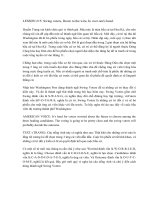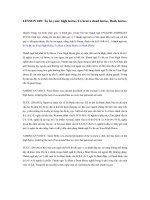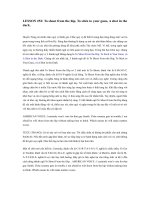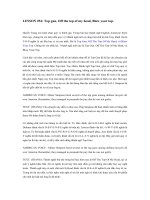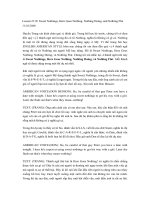Tài liệu ORAL TOPIC - 1 docx
Bạn đang xem bản rút gọn của tài liệu. Xem và tải ngay bản đầy đủ của tài liệu tại đây (14.32 KB, 5 trang )
ORAL TOPIC - 1
1- Public Administration
The term “administration” has a long history. Some authors consider
that the term coincides with the formation of the state long ago.
In it broadest sense, administration can be defined as the activities of
groups cooperating to accomplish common goals.
Public administration is art or sience. The first, it is an art because
some people have a gift for administration and become natural
administrators. As a sience, public administration requires necessary
tools that allow for the digestion and transference of information.
Lawrence considers public administration as a professio. Public
administration includees whatever the public employees of the world do
ranging from typing documents to running general elections.
According to Fletcher, “public administration can be used to denote:
(1) The activity of public servants; (2) The structure of executive
government: that is the institutions and patterns of relationships through
which the activity of public servants as carried on; (3) The study of (1)
and (2).
Waldo gave the following definition of public administration: “ (1)
public administration is the organization and management of men and
materials to achive the purposes of government. (2) public administration
is the art and sience of management as applied to affairs of the state.
The components of the executive are :administrative power” and
“regulatory power”. Administration institutions are comprised of legal
and regulatory documents and rules to govern the organizations.
2- The political system of the SRV
The SRV is an independent and sovereign country enjoying unity and
territorial intergrity, including its mailand, islands, territorial waters and
air space. The political system of the SRV consist of the state, the
Communist Party of Vietnam and the socio-political organization in VN.
The SRV is a state of the people, from the people, for the people. All
state power belongs to the people and is based on an alliance between the
working class, the peasantry and the intelligentsia. The state consist of
the government, the national assembly and the judiciary. The state
guarantees and unceasingly promotes the people’s mastery in all fields,
and severly punishes all acts violating the interest of the motherland and
the people; it strive to build a rich and strong country.
The CPV, the vanguard of the Vietnamese working class, the faithful
representative of the rights and interest of the working calss, the toiling
people, and the whole nation, acting upon the Marxist- Leninist doctrine
and Ho Chi Minh;s thought, is the force leading the state and society. All
party organizations operatie with the framework of the constitution and
the law.
The socio- political organizations consist of The Vietnam Fatherland
Front and its member organization s, which constitute the political bese
of People’s power. The main functions of the Front are promoting the
tradition of national solidarity, strengthening the people’s unity of mind
in political and spiritual matters, participating in the building and
consolidation of people’s power.
3- The National Assembly of the SRV
In the SRV, the only organ with constitutional and legislative power is
the NA. The NA has the obligation and power to make and to amend
laws, to work out a program for making laws and dcree-laws.
According to the 1992 Constitution, the Country’s President, the
Standing Committees of NA, the Nationalities Council and Committees
of NA, the Government, the Supreme People’s Court, the Supreme
People’s office of Supervision and Control, the Vietnam Fatherland Front
and its member organizations may present drawf laws to the NA.
Laws and resolutions of the NA must be approved by more than half
of the total membarship of the NA; but decisions taken by the NA to
amend the Constitution as stated in Article 147 must be approved by at
least two- thirds of its total membership. Laws and resolutions of the NA
must be made pblic fifteen days after their adoption at the least.
The role of the Permanent Committee of the NA is to interpret the
Constitution, the law and decree- laws, to enact decree-law on matters
entrusted to it by the NA.
4- The Government of the SRV
The Government of the SRV is the excutive body of the NA and the
highest state administrative body of the SRV.
The Government assumes the unified administration of the
implementation of all political, economic, cultural, social, national
defense, security and external activities of the state.
The Government is accountable to the NA, the Satnding Committee of
the NA and the President of the sate.
The Government consist of ministries and ministerial level agencies.
The NA appoints the Prime Minister, Vice- Prime Minister, ministers and
heads of ministerial agencies.




